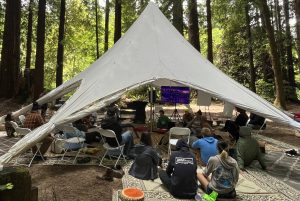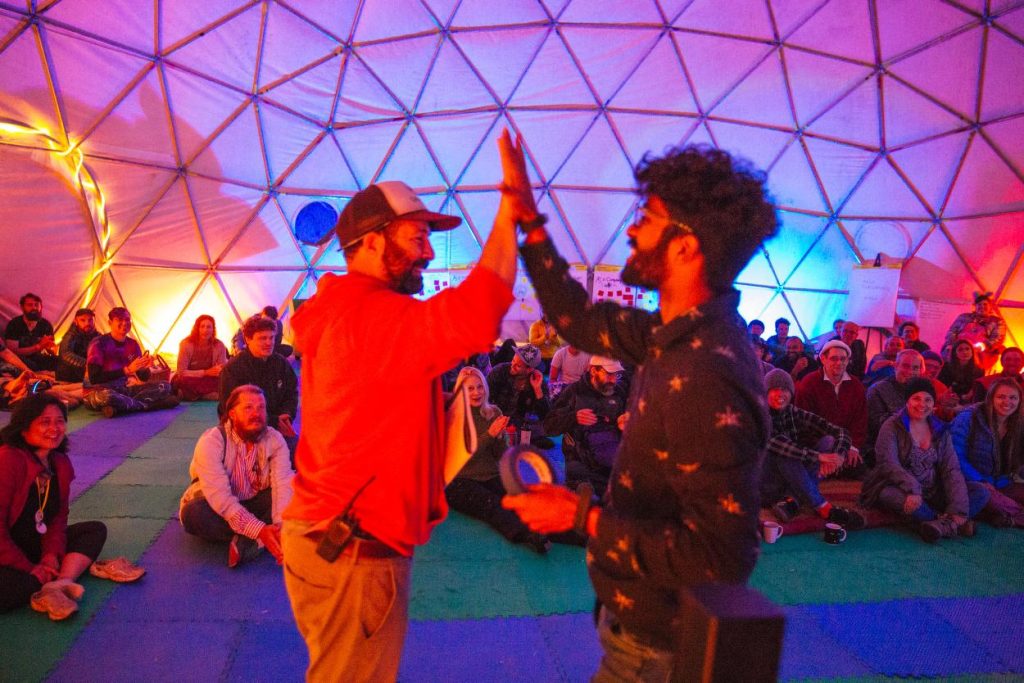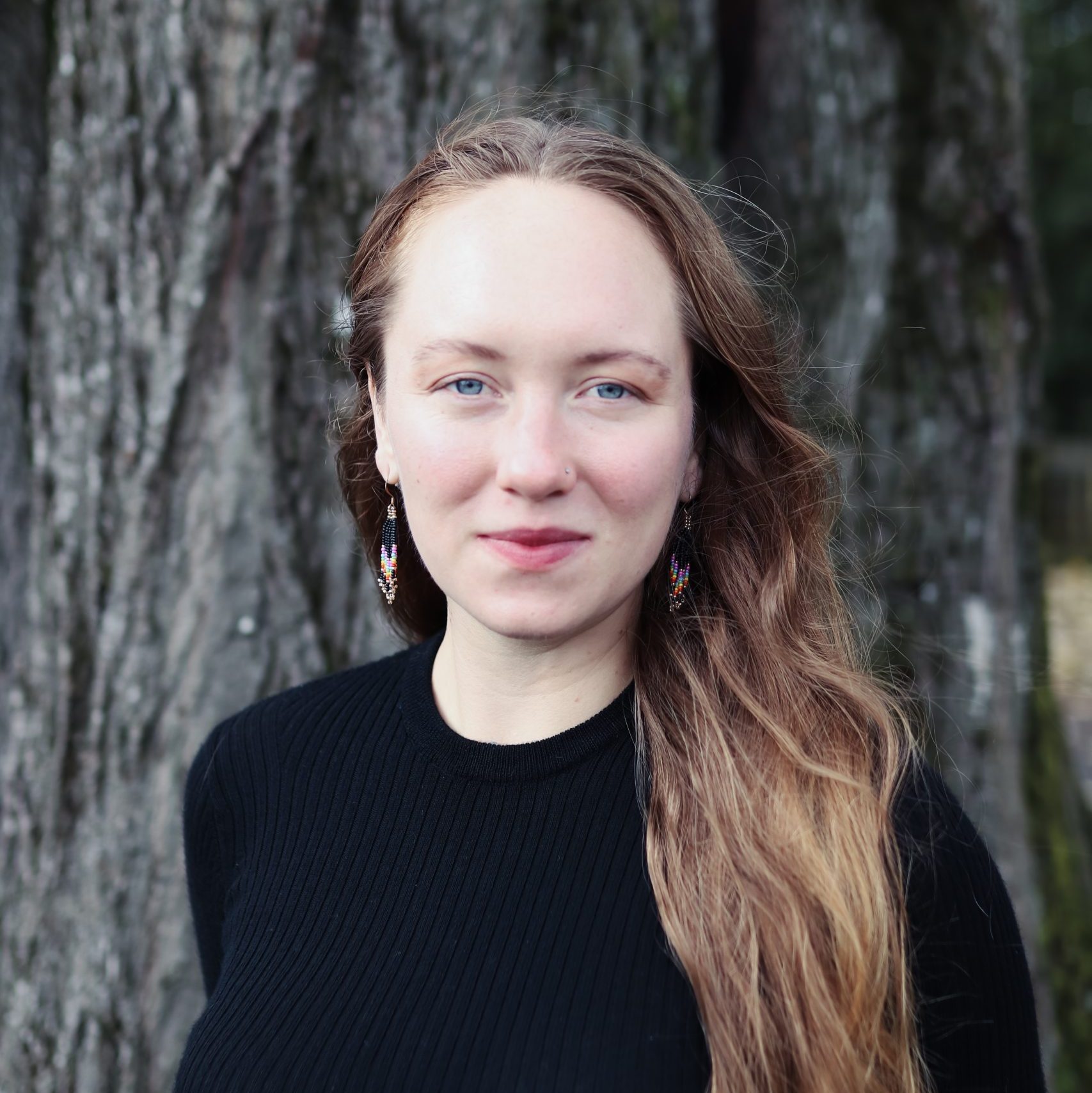On June 24, 2023 — the first anniversary of the United States Supreme Court Dobbs v. Jackson Women’s Health Organization (2022) decision which ended the federal right to bodily autonomy for over half of the U.S. population — representatives from six abortion and gender-affirming care organizations were in the California redwoods.
The event they were attending, Dweb Camp, is something like a summer camp for techies interested in building decentralized (read: community-owned and -governed) digital infrastructure, as well as the people who need such tools. Sometimes, those individuals are one and the same.
At Dweb Camp my organization Fight for the Future looked to further bridge the gap between tech projects and the front-line activists, journalists, and marginalized people they aim to serve. Amid our advocacy work for the First Amendment right to code and against financial surveillance, we’ve found that a lot is getting lost in translation. First and foremost, what’s missing between tech and activism is trust.
Three days of listening, learning, and brainstorming
For three days, participants learned from, and brainstormed with, people on the front lines of the struggle to maintain access to abortion and gender-affirming care. In a pillow-strewn tent in the redwoods, perhaps more reminiscent of Burning Man than a tech conference, we first heard from the organizations themselves.

They told us about the technologies mutual aid organizers have “frankensteined” together, often at significant personal risk, to send money to patients; the multifaceted challenges they face meeting a huge demand with well-vetted volunteers; and the constant threat of surveillance, deplatforming, and censorship that extremists are weaponizing to try and scare them into halting their still-legal operations.
The experience was as sobering as it was inspiring, and led into a second day that focused on what tech projects might do to ease the burden and help keep people safe.
While our day two conversation sometimes slipped into the weeds of tech, the takeaway was clear: as one abortion fund representative told me, decentralized tools could be a game-changer. They only wished that the technologies weren’t so early in their development, because they’re needed now.
Why decentralization is key to health and financial privacy
Just weeks prior to Dweb Camp, Atlanta law enforcement subpoenaed the PayPal data of the bail fund supporting #StopCopCity protesters. Ahead of a pivotal city council vote on whether to fund the massive police training facility — a time when major protests were planned — the police used this PayPal data to arrest bail fund organizers in a militarized raid, and charge them with money laundering.
Mutual-aid organizations are well aware that the mass communications surveillance revealed by the likes of Edward Snowden is the tip of the iceberg; 9/11 also provided cover for the U.S. government to ramp up its financial surveillance. Today, every non-cash transaction of every person in the U.S. is surveilled. It is only with the advent of technologies like cryptocurrencies and digital dollars that mainstream privacy advocates are re-examining the abuses of big banks and the federal government.
The fact is, our digital lives will never be safe without truly private, unsubpoenable financial options that re-establish our Fourth Amendment rights — protection from unreasonable searches and seizures by the government —for the first time in a generation.
Amid the gleeful techlash reporting on the downfall of some of the industry’s biggest players, like recently-indicted FTX Founder Sam Bankman-Fried, there are also responsible people. These folks are building alternatives to the surveillance and moralizing censorship of both big tech and big banks.
At Dweb Camp we heard about a Discord alternative with the privacy of Signal; a technology that breaks the monetary link between an abortion fund and an abortion patient; as well as uncensorable ways to share information on gender-affirming healthcare, as state attorney generals seek to ban it from the internet.
It’s through working together toward making such systems a reality that activism and tech can build the trust and community we need. The truth is that mutual aid funds — whether they are for bail, disaster relief, abortion, or gender-affirming care — have operated in a decentralized manner, at a very high level, for a very long time. Emerging tech projects have a lot to learn from them — not only about serving their needs, but in making the transition from philosophy to real-world impact.
How “unconferencing” helped build trust and grow ideas
On the third day of Dweb Camp, the organizers decided to do something different. We switched to an unconference format, in which all were invited to create the sessions we wanted to have on the spot. While many of the big names left once their scheduled appearances were done, the sessions held on this day were universally lauded as the best of the event.
After a brave attempt at building a decentralized app to ease our unconferencing failed, we used paper and large plywood boards to schedule interdisciplinary conversations at dozens of venues around the summer camp. The “Tech for Bodily Autonomy” track participants joined forces with another decentralized community still establishing its presence at the event, the “Arts” track. We wanted to dig deeper into the growing pains of the kind of internet we’d all rather have.
However, at that point, the entire facility’s power went out. Suddenly, the portable bathrooms throughout the campgrounds, which many had eschewed, were our best option for waste. Anything that wasn’t on a battery was dead, and plans began to form, organized by an attendee with experience in building decentralized power infrastructure, to collectively wire up our car batteries. I volunteered my Subaru, excited at the prospect of learning something totally new.
Not knowing what we’d find when we came back, we rallied our group and headed to an area of woven mats in a redwood grove. Our infrastructure concerns were, after all, incredibly privileged. We all knew we could just drive away if it came to it, so our focus returned to drilling down on the lessons our decades-old, decentralized networks had for the new ones we need to grow online.
We established a frame for thinking about the type of people that came to Dweb Camp, and named a binary: the “what” people, and the “why” people. For some, the “what” is concrete: making the actual function of the technology, the way it is coded, their focus. For others, the “why” is the only thing that isn’t abstract — they want technologies that they can use for social change, for art, and to build better communities. They don’t care how it works, they just want people they can trust working under the hood. Together, we recognized the immaturity of common language between the two as a point of friction — a growing pain of not only Dweb Camp, but of decentralized technology itself.
Dissolving the binary toward the common language of stories
Over the course of the next hour, we mirrored what the Tech for Bodily Autonomy track did that week: we dissolved the binary. Because, by and large, what we found was that the common language between techie and activist, between legislator and advocate and journalist and society is a currency we all love: stories.
For these sorts of new technologies to succeed, the “why” people must also transcend to become the “what”. As a privacy-preserving, end-to-end encrypted messaging service, Signal has become a crucial tool for everyone from antifascist organizers to the U.S. Intelligence Service because of what it does for them — not the tech specs. Activist-decentralized technologies, if they are to rise and replace the power- and data-hungry hegemony of big tech billionaires, need stories, too. These stories need to be big and loud and real, coming faster than misguided legislators can act to outlaw privacy-preserving tech or the right to contribute to open source software projects.
The sessions we organized could have taken place nowhere else. Dweb is a brainchild of the Internet Archive, an organization perhaps best known for its WayBack Machine, a publicly -accessible archiving project that preserves the history of the internet. The principles of Dweb are embodied in its participants — including not only the circles of tech and activism around the Internet Archive, but also supporting leadership from 30+ Dweb Fellows attending from around the world. While the men’s bathroom line was still disconcertingly long, a beige flag for many a tech event, Dweb Camp was refreshingly intentional about elevating the perspectives often absent from traditional tech spaces.
And therein lies what is truly remarkable about Dweb: it has created a medium, built on a foundation of inclusion that, while imperfect, works eagerly to put traditionally marginalized folks at the center of conversation. This is a community where in real time I watched binaries dissolve between tech and activism, an event that’s hungry to facilitate more such work. I trust Dweb to continue its evolution toward ever-more interdisciplinary efforts, as well as establish inroads toward funding to carry Dweb Camp’s uplifting tech philosophy into a globally impactful reality.

After that last conversation, which carried over well into lunch, we climbed the hill back to the lodge and found the electricity was back on. Things settled down into more conversations, hugs and last-minute introductions, a talent show, and a silent disco stretching into the wee hours. As I watched people dance, I was already plotting for the following week. It felt like these were people who could dream up a new story for our digital world, and make it happen too.









